Entrepreneurship and Small Business Management Report - BUS 101
VerifiedAdded on 2020/12/09
|13
|4820
|103
Report
AI Summary
This report delves into the multifaceted world of entrepreneurship and small business management. It begins by defining entrepreneurship and exploring various types of entrepreneurial ventures, including small businesses, scalable startups, large company entrepreneurship, and social entrepreneurship, along with a discussion of start-ups, acquisitions, franchises, joint ventures, and public-private partnerships. The report then examines the differences and similarities between these ventures across various factors like goals, risks, employee numbers, and organizational structure. It further investigates the impact of micro, small, medium, and large businesses on the economy, highlighting their contributions to economic growth, job creation, and technological advancements. Finally, the report emphasizes the critical role of small businesses and startups in fostering social and economic growth, underscoring their importance in job creation, GDP enhancement, and overall societal development, while also outlining the characteristics and skills of successful entrepreneurs and how background and experience can influence their entrepreneurial journey.

ENTREPRENEURSHIP
AND SMALL
BUSINESSES
MANAGEMENT
AND SMALL
BUSINESSES
MANAGEMENT
Paraphrase This Document
Need a fresh take? Get an instant paraphrase of this document with our AI Paraphraser
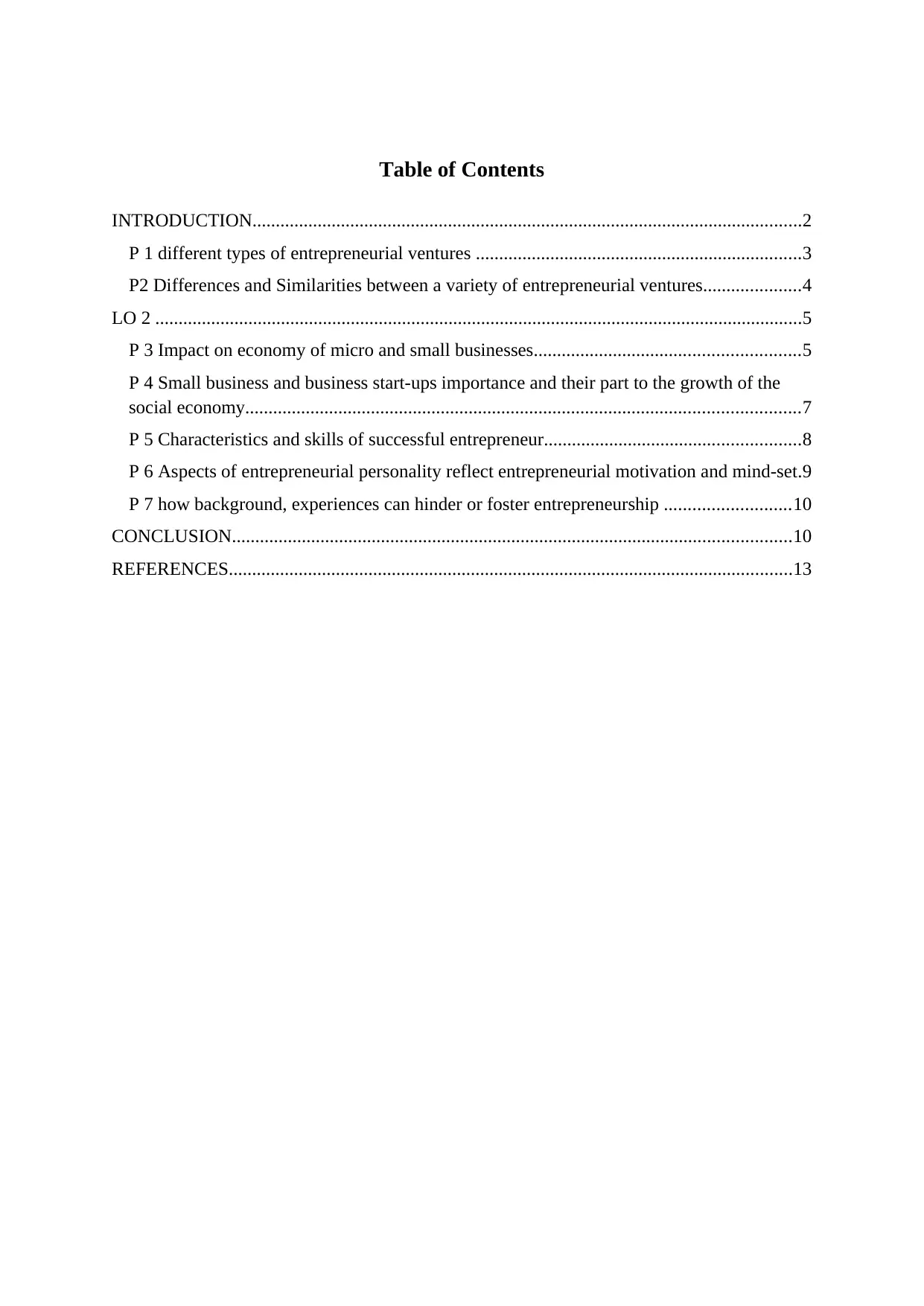
Table of Contents
INTRODUCTION......................................................................................................................2
P 1 different types of entrepreneurial ventures ......................................................................3
P2 Differences and Similarities between a variety of entrepreneurial ventures.....................4
LO 2 ...........................................................................................................................................5
P 3 Impact on economy of micro and small businesses.........................................................5
P 4 Small business and business start-ups importance and their part to the growth of the
social economy.......................................................................................................................7
P 5 Characteristics and skills of successful entrepreneur.......................................................8
P 6 Aspects of entrepreneurial personality reflect entrepreneurial motivation and mind-set.9
P 7 how background, experiences can hinder or foster entrepreneurship ...........................10
CONCLUSION........................................................................................................................10
REFERENCES.........................................................................................................................13
INTRODUCTION......................................................................................................................2
P 1 different types of entrepreneurial ventures ......................................................................3
P2 Differences and Similarities between a variety of entrepreneurial ventures.....................4
LO 2 ...........................................................................................................................................5
P 3 Impact on economy of micro and small businesses.........................................................5
P 4 Small business and business start-ups importance and their part to the growth of the
social economy.......................................................................................................................7
P 5 Characteristics and skills of successful entrepreneur.......................................................8
P 6 Aspects of entrepreneurial personality reflect entrepreneurial motivation and mind-set.9
P 7 how background, experiences can hinder or foster entrepreneurship ...........................10
CONCLUSION........................................................................................................................10
REFERENCES.........................................................................................................................13
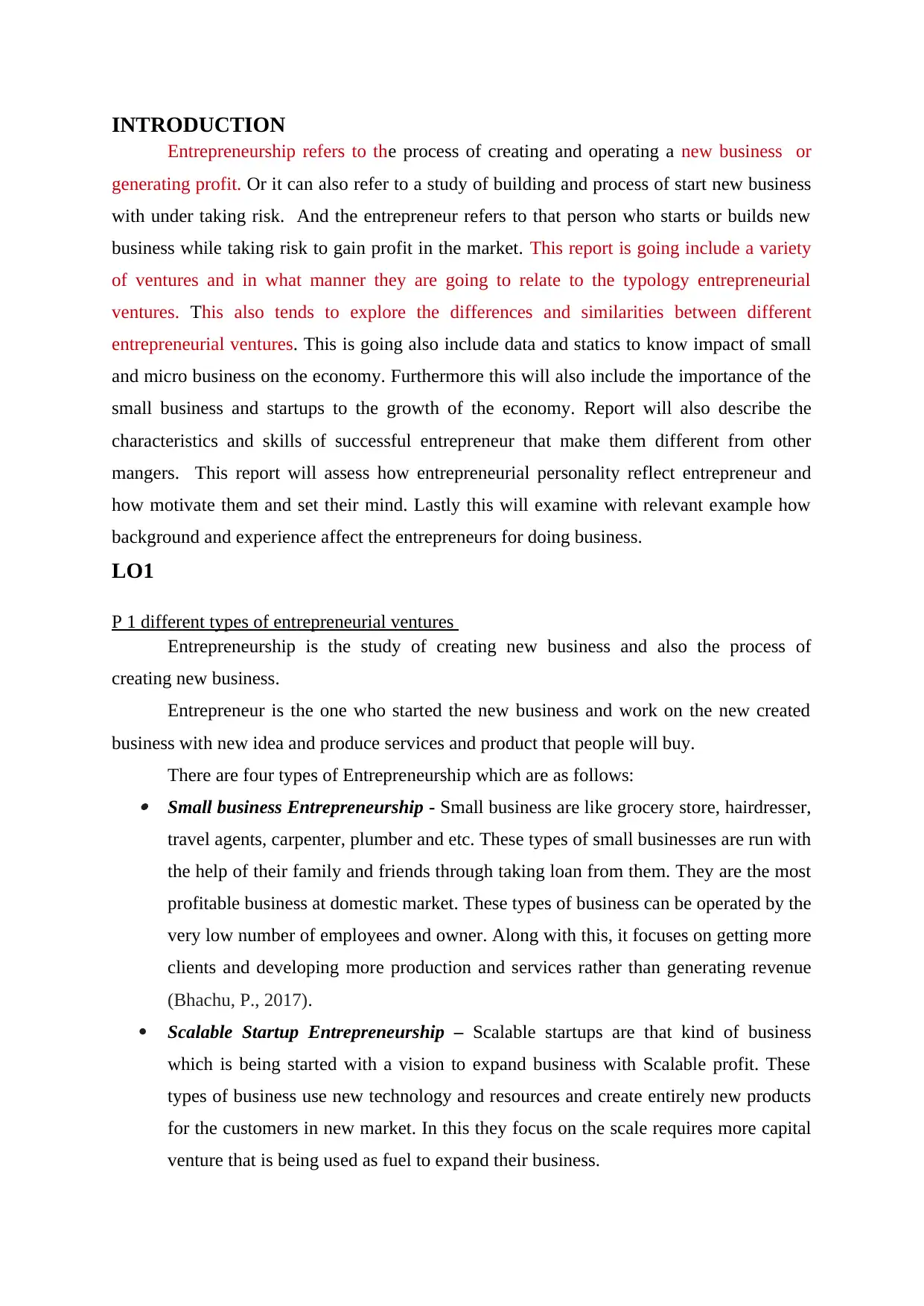
INTRODUCTION
Entrepreneurship refers to the process of creating and operating a new business or
generating profit. Or it can also refer to a study of building and process of start new business
with under taking risk. And the entrepreneur refers to that person who starts or builds new
business while taking risk to gain profit in the market. This report is going include a variety
of ventures and in what manner they are going to relate to the typology entrepreneurial
ventures. This also tends to explore the differences and similarities between different
entrepreneurial ventures. This is going also include data and statics to know impact of small
and micro business on the economy. Furthermore this will also include the importance of the
small business and startups to the growth of the economy. Report will also describe the
characteristics and skills of successful entrepreneur that make them different from other
mangers. This report will assess how entrepreneurial personality reflect entrepreneur and
how motivate them and set their mind. Lastly this will examine with relevant example how
background and experience affect the entrepreneurs for doing business.
LO1
P 1 different types of entrepreneurial ventures
Entrepreneurship is the study of creating new business and also the process of
creating new business.
Entrepreneur is the one who started the new business and work on the new created
business with new idea and produce services and product that people will buy.
There are four types of Entrepreneurship which are as follows: Small business Entrepreneurship - Small business are like grocery store, hairdresser,
travel agents, carpenter, plumber and etc. These types of small businesses are run with
the help of their family and friends through taking loan from them. They are the most
profitable business at domestic market. These types of business can be operated by the
very low number of employees and owner. Along with this, it focuses on getting more
clients and developing more production and services rather than generating revenue
(Bhachu, P., 2017).
Scalable Startup Entrepreneurship – Scalable startups are that kind of business
which is being started with a vision to expand business with Scalable profit. These
types of business use new technology and resources and create entirely new products
for the customers in new market. In this they focus on the scale requires more capital
venture that is being used as fuel to expand their business.
Entrepreneurship refers to the process of creating and operating a new business or
generating profit. Or it can also refer to a study of building and process of start new business
with under taking risk. And the entrepreneur refers to that person who starts or builds new
business while taking risk to gain profit in the market. This report is going include a variety
of ventures and in what manner they are going to relate to the typology entrepreneurial
ventures. This also tends to explore the differences and similarities between different
entrepreneurial ventures. This is going also include data and statics to know impact of small
and micro business on the economy. Furthermore this will also include the importance of the
small business and startups to the growth of the economy. Report will also describe the
characteristics and skills of successful entrepreneur that make them different from other
mangers. This report will assess how entrepreneurial personality reflect entrepreneur and
how motivate them and set their mind. Lastly this will examine with relevant example how
background and experience affect the entrepreneurs for doing business.
LO1
P 1 different types of entrepreneurial ventures
Entrepreneurship is the study of creating new business and also the process of
creating new business.
Entrepreneur is the one who started the new business and work on the new created
business with new idea and produce services and product that people will buy.
There are four types of Entrepreneurship which are as follows: Small business Entrepreneurship - Small business are like grocery store, hairdresser,
travel agents, carpenter, plumber and etc. These types of small businesses are run with
the help of their family and friends through taking loan from them. They are the most
profitable business at domestic market. These types of business can be operated by the
very low number of employees and owner. Along with this, it focuses on getting more
clients and developing more production and services rather than generating revenue
(Bhachu, P., 2017).
Scalable Startup Entrepreneurship – Scalable startups are that kind of business
which is being started with a vision to expand business with Scalable profit. These
types of business use new technology and resources and create entirely new products
for the customers in new market. In this they focus on the scale requires more capital
venture that is being used as fuel to expand their business.
⊘ This is a preview!⊘
Do you want full access?
Subscribe today to unlock all pages.

Trusted by 1+ million students worldwide
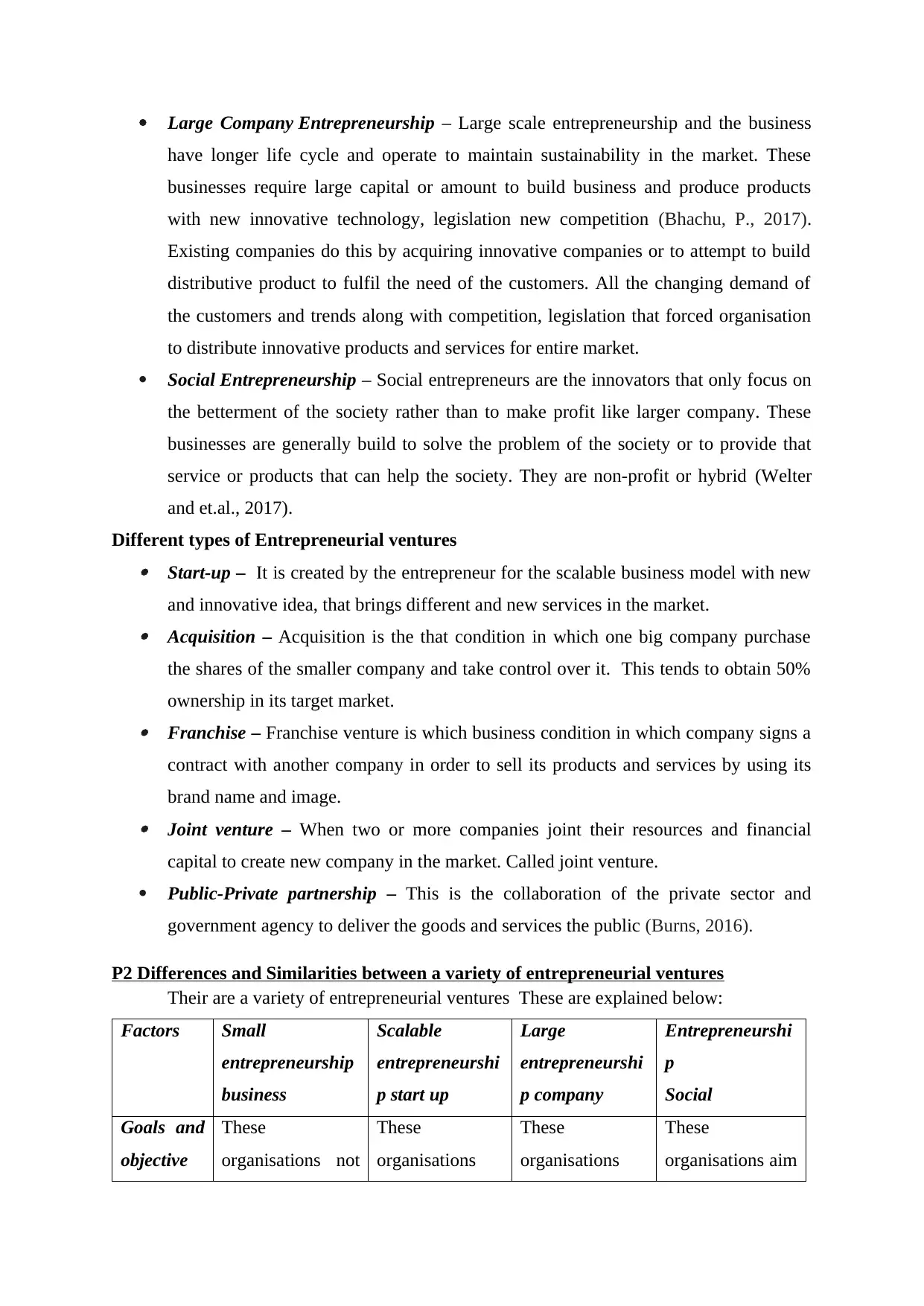
Large Company Entrepreneurship – Large scale entrepreneurship and the business
have longer life cycle and operate to maintain sustainability in the market. These
businesses require large capital or amount to build business and produce products
with new innovative technology, legislation new competition (Bhachu, P., 2017).
Existing companies do this by acquiring innovative companies or to attempt to build
distributive product to fulfil the need of the customers. All the changing demand of
the customers and trends along with competition, legislation that forced organisation
to distribute innovative products and services for entire market.
Social Entrepreneurship – Social entrepreneurs are the innovators that only focus on
the betterment of the society rather than to make profit like larger company. These
businesses are generally build to solve the problem of the society or to provide that
service or products that can help the society. They are non-profit or hybrid (Welter
and et.al., 2017).
Different types of Entrepreneurial ventures Start-up – It is created by the entrepreneur for the scalable business model with new
and innovative idea, that brings different and new services in the market. Acquisition – Acquisition is the that condition in which one big company purchase
the shares of the smaller company and take control over it. This tends to obtain 50%
ownership in its target market. Franchise – Franchise venture is which business condition in which company signs a
contract with another company in order to sell its products and services by using its
brand name and image. Joint venture – When two or more companies joint their resources and financial
capital to create new company in the market. Called joint venture.
Public-Private partnership – This is the collaboration of the private sector and
government agency to deliver the goods and services the public (Burns, 2016).
P2 Differences and Similarities between a variety of entrepreneurial ventures
Their are a variety of entrepreneurial ventures These are explained below:
Factors Small
entrepreneurship
business
Scalable
entrepreneurshi
p start up
Large
entrepreneurshi
p company
Entrepreneurshi
p
Social
Goals and
objective
These
organisations not
These
organisations
These
organisations
These
organisations aim
have longer life cycle and operate to maintain sustainability in the market. These
businesses require large capital or amount to build business and produce products
with new innovative technology, legislation new competition (Bhachu, P., 2017).
Existing companies do this by acquiring innovative companies or to attempt to build
distributive product to fulfil the need of the customers. All the changing demand of
the customers and trends along with competition, legislation that forced organisation
to distribute innovative products and services for entire market.
Social Entrepreneurship – Social entrepreneurs are the innovators that only focus on
the betterment of the society rather than to make profit like larger company. These
businesses are generally build to solve the problem of the society or to provide that
service or products that can help the society. They are non-profit or hybrid (Welter
and et.al., 2017).
Different types of Entrepreneurial ventures Start-up – It is created by the entrepreneur for the scalable business model with new
and innovative idea, that brings different and new services in the market. Acquisition – Acquisition is the that condition in which one big company purchase
the shares of the smaller company and take control over it. This tends to obtain 50%
ownership in its target market. Franchise – Franchise venture is which business condition in which company signs a
contract with another company in order to sell its products and services by using its
brand name and image. Joint venture – When two or more companies joint their resources and financial
capital to create new company in the market. Called joint venture.
Public-Private partnership – This is the collaboration of the private sector and
government agency to deliver the goods and services the public (Burns, 2016).
P2 Differences and Similarities between a variety of entrepreneurial ventures
Their are a variety of entrepreneurial ventures These are explained below:
Factors Small
entrepreneurship
business
Scalable
entrepreneurshi
p start up
Large
entrepreneurshi
p company
Entrepreneurshi
p
Social
Goals and
objective
These
organisations not
These
organisations
These
organisations
These
organisations aim
Paraphrase This Document
Need a fresh take? Get an instant paraphrase of this document with our AI Paraphraser
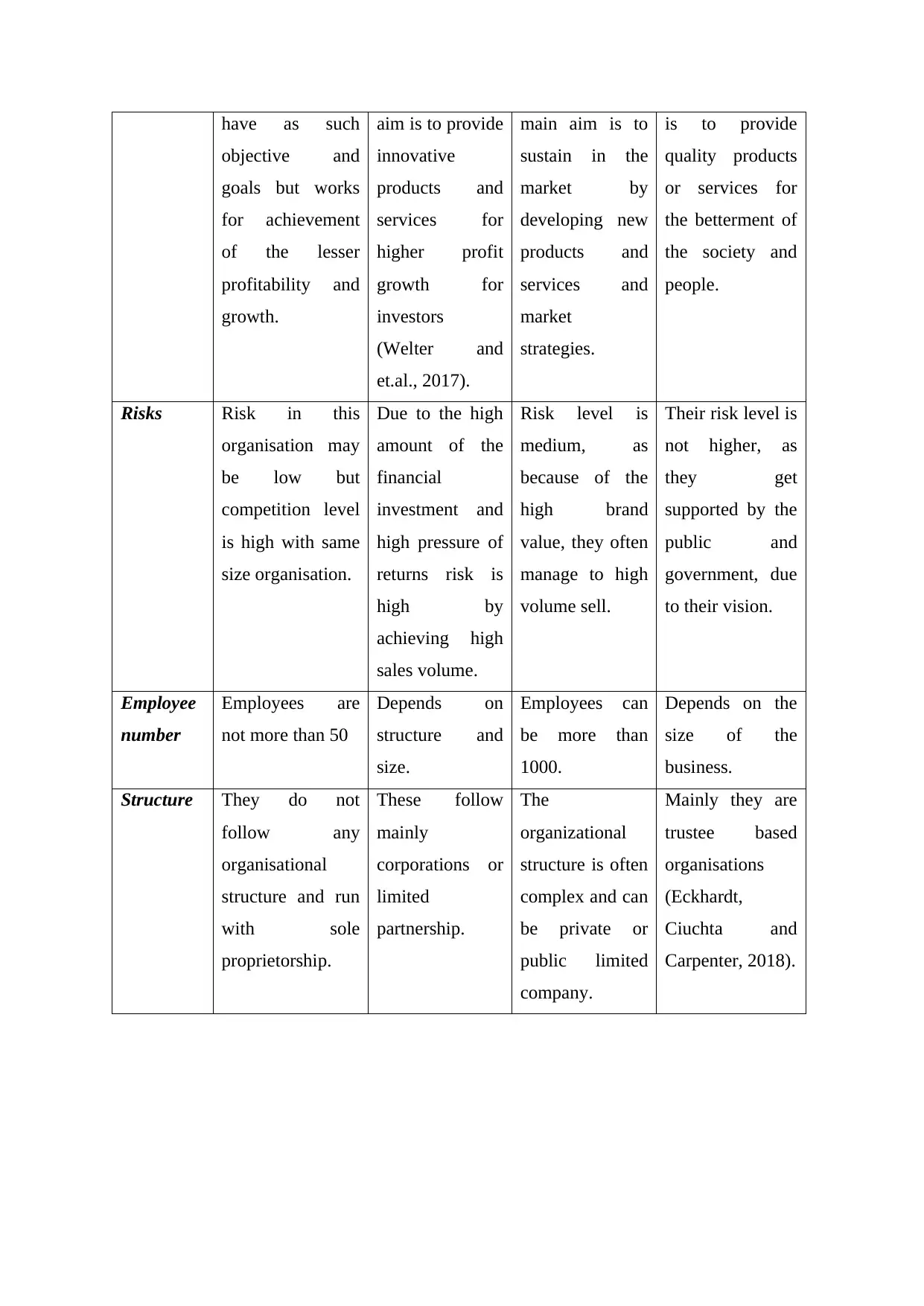
have as such
objective and
goals but works
for achievement
of the lesser
profitability and
growth.
aim is to provide
innovative
products and
services for
higher profit
growth for
investors
(Welter and
et.al., 2017).
main aim is to
sustain in the
market by
developing new
products and
services and
market
strategies.
is to provide
quality products
or services for
the betterment of
the society and
people.
Risks Risk in this
organisation may
be low but
competition level
is high with same
size organisation.
Due to the high
amount of the
financial
investment and
high pressure of
returns risk is
high by
achieving high
sales volume.
Risk level is
medium, as
because of the
high brand
value, they often
manage to high
volume sell.
Their risk level is
not higher, as
they get
supported by the
public and
government, due
to their vision.
Employee
number
Employees are
not more than 50
Depends on
structure and
size.
Employees can
be more than
1000.
Depends on the
size of the
business.
Structure They do not
follow any
organisational
structure and run
with sole
proprietorship.
These follow
mainly
corporations or
limited
partnership.
The
organizational
structure is often
complex and can
be private or
public limited
company.
Mainly they are
trustee based
organisations
(Eckhardt,
Ciuchta and
Carpenter, 2018).
objective and
goals but works
for achievement
of the lesser
profitability and
growth.
aim is to provide
innovative
products and
services for
higher profit
growth for
investors
(Welter and
et.al., 2017).
main aim is to
sustain in the
market by
developing new
products and
services and
market
strategies.
is to provide
quality products
or services for
the betterment of
the society and
people.
Risks Risk in this
organisation may
be low but
competition level
is high with same
size organisation.
Due to the high
amount of the
financial
investment and
high pressure of
returns risk is
high by
achieving high
sales volume.
Risk level is
medium, as
because of the
high brand
value, they often
manage to high
volume sell.
Their risk level is
not higher, as
they get
supported by the
public and
government, due
to their vision.
Employee
number
Employees are
not more than 50
Depends on
structure and
size.
Employees can
be more than
1000.
Depends on the
size of the
business.
Structure They do not
follow any
organisational
structure and run
with sole
proprietorship.
These follow
mainly
corporations or
limited
partnership.
The
organizational
structure is often
complex and can
be private or
public limited
company.
Mainly they are
trustee based
organisations
(Eckhardt,
Ciuchta and
Carpenter, 2018).
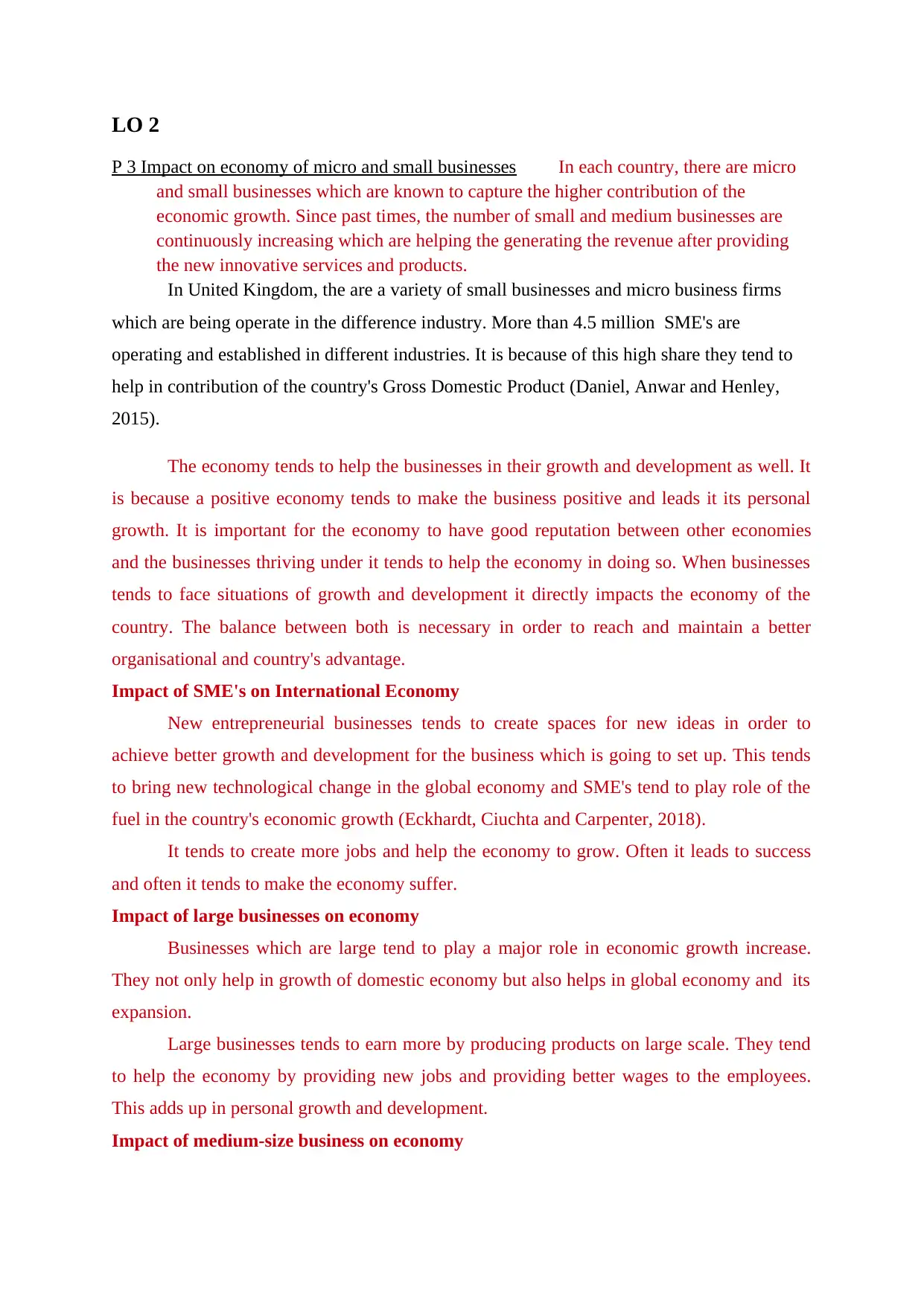
LO 2
P 3 Impact on economy of micro and small businesses In each country, there are micro
and small businesses which are known to capture the higher contribution of the
economic growth. Since past times, the number of small and medium businesses are
continuously increasing which are helping the generating the revenue after providing
the new innovative services and products.
In United Kingdom, the are a variety of small businesses and micro business firms
which are being operate in the difference industry. More than 4.5 million SME's are
operating and established in different industries. It is because of this high share they tend to
help in contribution of the country's Gross Domestic Product (Daniel, Anwar and Henley,
2015).
The economy tends to help the businesses in their growth and development as well. It
is because a positive economy tends to make the business positive and leads it its personal
growth. It is important for the economy to have good reputation between other economies
and the businesses thriving under it tends to help the economy in doing so. When businesses
tends to face situations of growth and development it directly impacts the economy of the
country. The balance between both is necessary in order to reach and maintain a better
organisational and country's advantage.
Impact of SME's on International Economy
New entrepreneurial businesses tends to create spaces for new ideas in order to
achieve better growth and development for the business which is going to set up. This tends
to bring new technological change in the global economy and SME's tend to play role of the
fuel in the country's economic growth (Eckhardt, Ciuchta and Carpenter, 2018).
It tends to create more jobs and help the economy to grow. Often it leads to success
and often it tends to make the economy suffer.
Impact of large businesses on economy
Businesses which are large tend to play a major role in economic growth increase.
They not only help in growth of domestic economy but also helps in global economy and its
expansion.
Large businesses tends to earn more by producing products on large scale. They tend
to help the economy by providing new jobs and providing better wages to the employees.
This adds up in personal growth and development.
Impact of medium-size business on economy
P 3 Impact on economy of micro and small businesses In each country, there are micro
and small businesses which are known to capture the higher contribution of the
economic growth. Since past times, the number of small and medium businesses are
continuously increasing which are helping the generating the revenue after providing
the new innovative services and products.
In United Kingdom, the are a variety of small businesses and micro business firms
which are being operate in the difference industry. More than 4.5 million SME's are
operating and established in different industries. It is because of this high share they tend to
help in contribution of the country's Gross Domestic Product (Daniel, Anwar and Henley,
2015).
The economy tends to help the businesses in their growth and development as well. It
is because a positive economy tends to make the business positive and leads it its personal
growth. It is important for the economy to have good reputation between other economies
and the businesses thriving under it tends to help the economy in doing so. When businesses
tends to face situations of growth and development it directly impacts the economy of the
country. The balance between both is necessary in order to reach and maintain a better
organisational and country's advantage.
Impact of SME's on International Economy
New entrepreneurial businesses tends to create spaces for new ideas in order to
achieve better growth and development for the business which is going to set up. This tends
to bring new technological change in the global economy and SME's tend to play role of the
fuel in the country's economic growth (Eckhardt, Ciuchta and Carpenter, 2018).
It tends to create more jobs and help the economy to grow. Often it leads to success
and often it tends to make the economy suffer.
Impact of large businesses on economy
Businesses which are large tend to play a major role in economic growth increase.
They not only help in growth of domestic economy but also helps in global economy and its
expansion.
Large businesses tends to earn more by producing products on large scale. They tend
to help the economy by providing new jobs and providing better wages to the employees.
This adds up in personal growth and development.
Impact of medium-size business on economy
⊘ This is a preview!⊘
Do you want full access?
Subscribe today to unlock all pages.

Trusted by 1+ million students worldwide
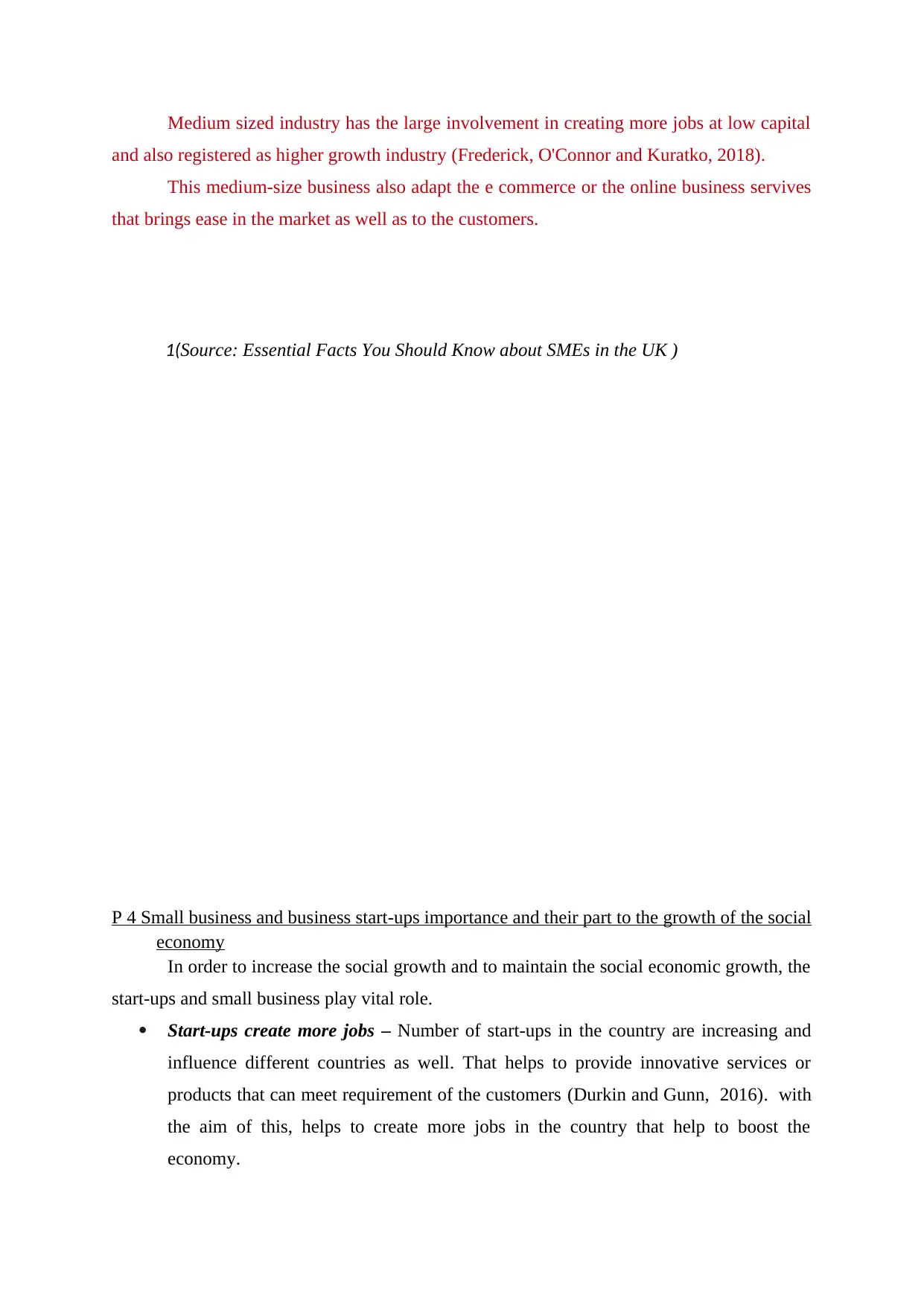
Medium sized industry has the large involvement in creating more jobs at low capital
and also registered as higher growth industry (Frederick, O'Connor and Kuratko, 2018).
This medium-size business also adapt the e commerce or the online business servives
that brings ease in the market as well as to the customers.
P 4 Small business and business start-ups importance and their part to the growth of the social
economy
In order to increase the social growth and to maintain the social economic growth, the
start-ups and small business play vital role.
Start-ups create more jobs – Number of start-ups in the country are increasing and
influence different countries as well. That helps to provide innovative services or
products that can meet requirement of the customers (Durkin and Gunn, 2016). with
the aim of this, helps to create more jobs in the country that help to boost the
economy.
1(Source: Essential Facts You Should Know about SMEs in the UK )
and also registered as higher growth industry (Frederick, O'Connor and Kuratko, 2018).
This medium-size business also adapt the e commerce or the online business servives
that brings ease in the market as well as to the customers.
P 4 Small business and business start-ups importance and their part to the growth of the social
economy
In order to increase the social growth and to maintain the social economic growth, the
start-ups and small business play vital role.
Start-ups create more jobs – Number of start-ups in the country are increasing and
influence different countries as well. That helps to provide innovative services or
products that can meet requirement of the customers (Durkin and Gunn, 2016). with
the aim of this, helps to create more jobs in the country that help to boost the
economy.
1(Source: Essential Facts You Should Know about SMEs in the UK )
Paraphrase This Document
Need a fresh take? Get an instant paraphrase of this document with our AI Paraphraser
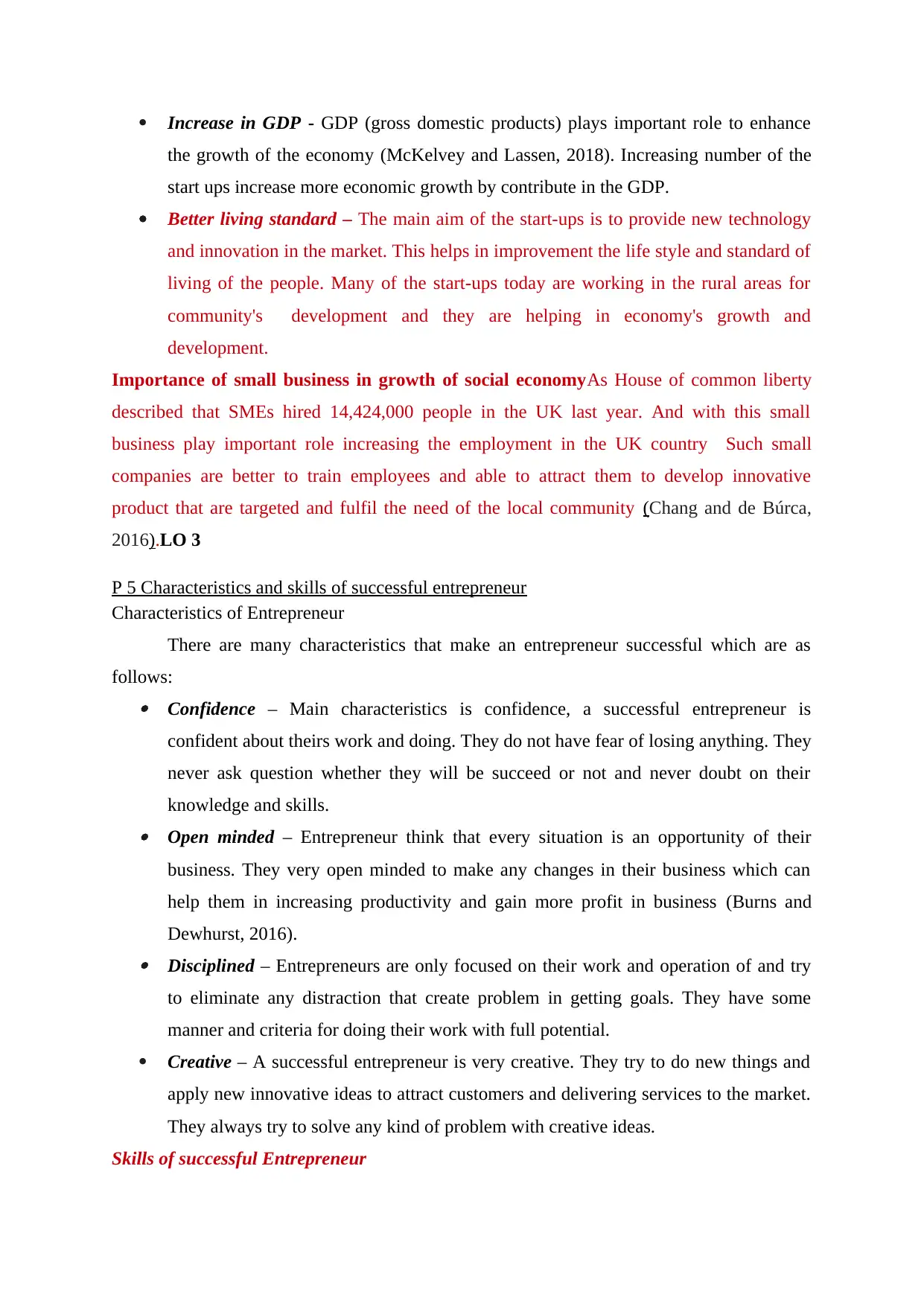
Increase in GDP - GDP (gross domestic products) plays important role to enhance
the growth of the economy (McKelvey and Lassen, 2018). Increasing number of the
start ups increase more economic growth by contribute in the GDP.
Better living standard – The main aim of the start-ups is to provide new technology
and innovation in the market. This helps in improvement the life style and standard of
living of the people. Many of the start-ups today are working in the rural areas for
community's development and they are helping in economy's growth and
development.
Importance of small business in growth of social economyAs House of common liberty
described that SMEs hired 14,424,000 people in the UK last year. And with this small
business play important role increasing the employment in the UK country Such small
companies are better to train employees and able to attract them to develop innovative
product that are targeted and fulfil the need of the local community (Chang and de Búrca,
2016).LO 3
P 5 Characteristics and skills of successful entrepreneur
Characteristics of Entrepreneur
There are many characteristics that make an entrepreneur successful which are as
follows: Confidence – Main characteristics is confidence, a successful entrepreneur is
confident about theirs work and doing. They do not have fear of losing anything. They
never ask question whether they will be succeed or not and never doubt on their
knowledge and skills. Open minded – Entrepreneur think that every situation is an opportunity of their
business. They very open minded to make any changes in their business which can
help them in increasing productivity and gain more profit in business (Burns and
Dewhurst, 2016). Disciplined – Entrepreneurs are only focused on their work and operation of and try
to eliminate any distraction that create problem in getting goals. They have some
manner and criteria for doing their work with full potential.
Creative – A successful entrepreneur is very creative. They try to do new things and
apply new innovative ideas to attract customers and delivering services to the market.
They always try to solve any kind of problem with creative ideas.
Skills of successful Entrepreneur
the growth of the economy (McKelvey and Lassen, 2018). Increasing number of the
start ups increase more economic growth by contribute in the GDP.
Better living standard – The main aim of the start-ups is to provide new technology
and innovation in the market. This helps in improvement the life style and standard of
living of the people. Many of the start-ups today are working in the rural areas for
community's development and they are helping in economy's growth and
development.
Importance of small business in growth of social economyAs House of common liberty
described that SMEs hired 14,424,000 people in the UK last year. And with this small
business play important role increasing the employment in the UK country Such small
companies are better to train employees and able to attract them to develop innovative
product that are targeted and fulfil the need of the local community (Chang and de Búrca,
2016).LO 3
P 5 Characteristics and skills of successful entrepreneur
Characteristics of Entrepreneur
There are many characteristics that make an entrepreneur successful which are as
follows: Confidence – Main characteristics is confidence, a successful entrepreneur is
confident about theirs work and doing. They do not have fear of losing anything. They
never ask question whether they will be succeed or not and never doubt on their
knowledge and skills. Open minded – Entrepreneur think that every situation is an opportunity of their
business. They very open minded to make any changes in their business which can
help them in increasing productivity and gain more profit in business (Burns and
Dewhurst, 2016). Disciplined – Entrepreneurs are only focused on their work and operation of and try
to eliminate any distraction that create problem in getting goals. They have some
manner and criteria for doing their work with full potential.
Creative – A successful entrepreneur is very creative. They try to do new things and
apply new innovative ideas to attract customers and delivering services to the market.
They always try to solve any kind of problem with creative ideas.
Skills of successful Entrepreneur
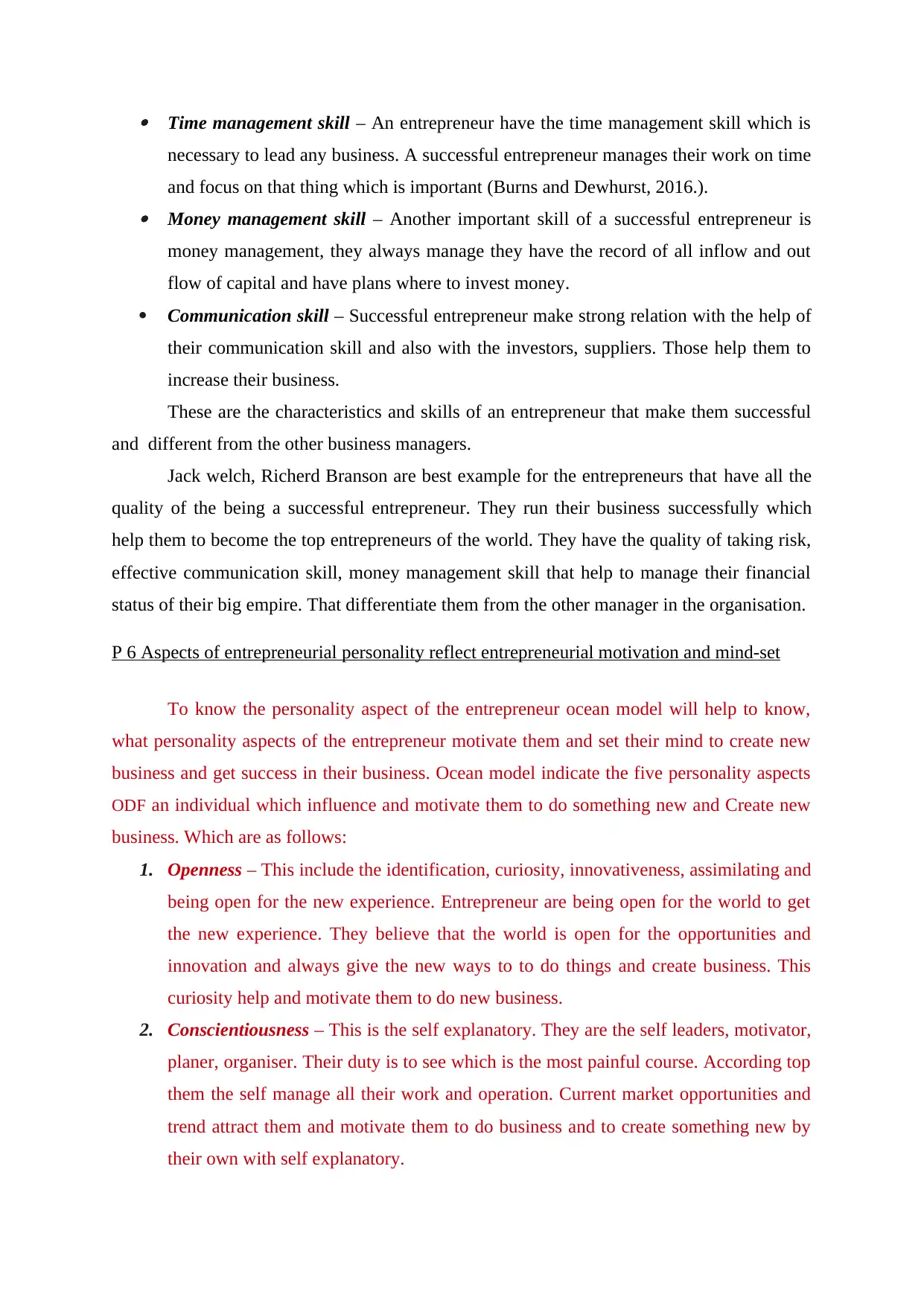
Time management skill – An entrepreneur have the time management skill which is
necessary to lead any business. A successful entrepreneur manages their work on time
and focus on that thing which is important (Burns and Dewhurst, 2016.). Money management skill – Another important skill of a successful entrepreneur is
money management, they always manage they have the record of all inflow and out
flow of capital and have plans where to invest money.
Communication skill – Successful entrepreneur make strong relation with the help of
their communication skill and also with the investors, suppliers. Those help them to
increase their business.
These are the characteristics and skills of an entrepreneur that make them successful
and different from the other business managers.
Jack welch, Richerd Branson are best example for the entrepreneurs that have all the
quality of the being a successful entrepreneur. They run their business successfully which
help them to become the top entrepreneurs of the world. They have the quality of taking risk,
effective communication skill, money management skill that help to manage their financial
status of their big empire. That differentiate them from the other manager in the organisation.
P 6 Aspects of entrepreneurial personality reflect entrepreneurial motivation and mind-set
To know the personality aspect of the entrepreneur ocean model will help to know,
what personality aspects of the entrepreneur motivate them and set their mind to create new
business and get success in their business. Ocean model indicate the five personality aspects
ODF an individual which influence and motivate them to do something new and Create new
business. Which are as follows:
1. Openness – This include the identification, curiosity, innovativeness, assimilating and
being open for the new experience. Entrepreneur are being open for the world to get
the new experience. They believe that the world is open for the opportunities and
innovation and always give the new ways to to do things and create business. This
curiosity help and motivate them to do new business.
2. Conscientiousness – This is the self explanatory. They are the self leaders, motivator,
planer, organiser. Their duty is to see which is the most painful course. According top
them the self manage all their work and operation. Current market opportunities and
trend attract them and motivate them to do business and to create something new by
their own with self explanatory.
necessary to lead any business. A successful entrepreneur manages their work on time
and focus on that thing which is important (Burns and Dewhurst, 2016.). Money management skill – Another important skill of a successful entrepreneur is
money management, they always manage they have the record of all inflow and out
flow of capital and have plans where to invest money.
Communication skill – Successful entrepreneur make strong relation with the help of
their communication skill and also with the investors, suppliers. Those help them to
increase their business.
These are the characteristics and skills of an entrepreneur that make them successful
and different from the other business managers.
Jack welch, Richerd Branson are best example for the entrepreneurs that have all the
quality of the being a successful entrepreneur. They run their business successfully which
help them to become the top entrepreneurs of the world. They have the quality of taking risk,
effective communication skill, money management skill that help to manage their financial
status of their big empire. That differentiate them from the other manager in the organisation.
P 6 Aspects of entrepreneurial personality reflect entrepreneurial motivation and mind-set
To know the personality aspect of the entrepreneur ocean model will help to know,
what personality aspects of the entrepreneur motivate them and set their mind to create new
business and get success in their business. Ocean model indicate the five personality aspects
ODF an individual which influence and motivate them to do something new and Create new
business. Which are as follows:
1. Openness – This include the identification, curiosity, innovativeness, assimilating and
being open for the new experience. Entrepreneur are being open for the world to get
the new experience. They believe that the world is open for the opportunities and
innovation and always give the new ways to to do things and create business. This
curiosity help and motivate them to do new business.
2. Conscientiousness – This is the self explanatory. They are the self leaders, motivator,
planer, organiser. Their duty is to see which is the most painful course. According top
them the self manage all their work and operation. Current market opportunities and
trend attract them and motivate them to do business and to create something new by
their own with self explanatory.
⊘ This is a preview!⊘
Do you want full access?
Subscribe today to unlock all pages.

Trusted by 1+ million students worldwide
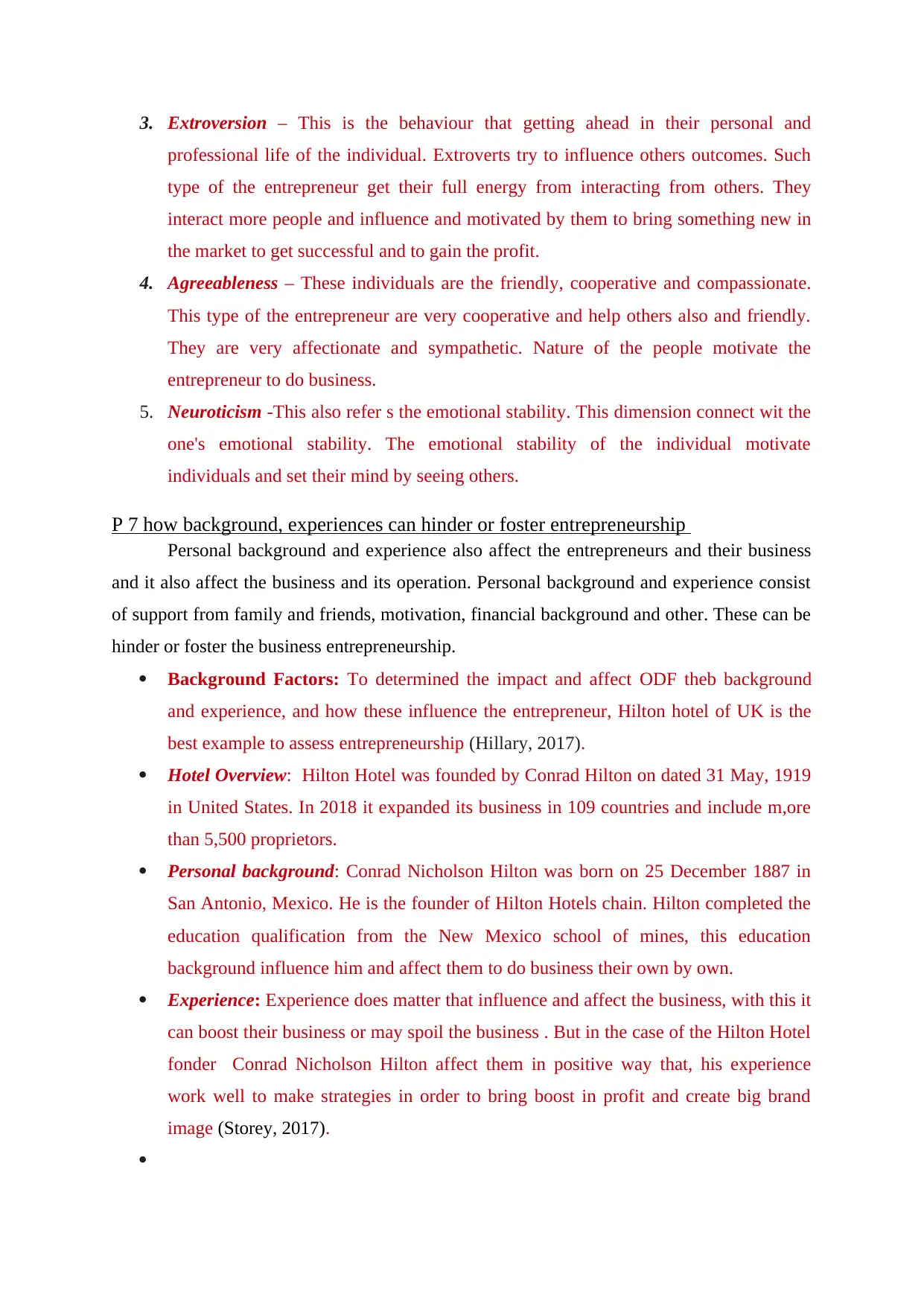
3. Extroversion – This is the behaviour that getting ahead in their personal and
professional life of the individual. Extroverts try to influence others outcomes. Such
type of the entrepreneur get their full energy from interacting from others. They
interact more people and influence and motivated by them to bring something new in
the market to get successful and to gain the profit.
4. Agreeableness – These individuals are the friendly, cooperative and compassionate.
This type of the entrepreneur are very cooperative and help others also and friendly.
They are very affectionate and sympathetic. Nature of the people motivate the
entrepreneur to do business.
5. Neuroticism -This also refer s the emotional stability. This dimension connect wit the
one's emotional stability. The emotional stability of the individual motivate
individuals and set their mind by seeing others.
P 7 how background, experiences can hinder or foster entrepreneurship
Personal background and experience also affect the entrepreneurs and their business
and it also affect the business and its operation. Personal background and experience consist
of support from family and friends, motivation, financial background and other. These can be
hinder or foster the business entrepreneurship.
Background Factors: To determined the impact and affect ODF theb background
and experience, and how these influence the entrepreneur, Hilton hotel of UK is the
best example to assess entrepreneurship (Hillary, 2017).
Hotel Overview: Hilton Hotel was founded by Conrad Hilton on dated 31 May, 1919
in United States. In 2018 it expanded its business in 109 countries and include m,ore
than 5,500 proprietors.
Personal background: Conrad Nicholson Hilton was born on 25 December 1887 in
San Antonio, Mexico. He is the founder of Hilton Hotels chain. Hilton completed the
education qualification from the New Mexico school of mines, this education
background influence him and affect them to do business their own by own.
Experience: Experience does matter that influence and affect the business, with this it
can boost their business or may spoil the business . But in the case of the Hilton Hotel
fonder Conrad Nicholson Hilton affect them in positive way that, his experience
work well to make strategies in order to bring boost in profit and create big brand
image (Storey, 2017).
professional life of the individual. Extroverts try to influence others outcomes. Such
type of the entrepreneur get their full energy from interacting from others. They
interact more people and influence and motivated by them to bring something new in
the market to get successful and to gain the profit.
4. Agreeableness – These individuals are the friendly, cooperative and compassionate.
This type of the entrepreneur are very cooperative and help others also and friendly.
They are very affectionate and sympathetic. Nature of the people motivate the
entrepreneur to do business.
5. Neuroticism -This also refer s the emotional stability. This dimension connect wit the
one's emotional stability. The emotional stability of the individual motivate
individuals and set their mind by seeing others.
P 7 how background, experiences can hinder or foster entrepreneurship
Personal background and experience also affect the entrepreneurs and their business
and it also affect the business and its operation. Personal background and experience consist
of support from family and friends, motivation, financial background and other. These can be
hinder or foster the business entrepreneurship.
Background Factors: To determined the impact and affect ODF theb background
and experience, and how these influence the entrepreneur, Hilton hotel of UK is the
best example to assess entrepreneurship (Hillary, 2017).
Hotel Overview: Hilton Hotel was founded by Conrad Hilton on dated 31 May, 1919
in United States. In 2018 it expanded its business in 109 countries and include m,ore
than 5,500 proprietors.
Personal background: Conrad Nicholson Hilton was born on 25 December 1887 in
San Antonio, Mexico. He is the founder of Hilton Hotels chain. Hilton completed the
education qualification from the New Mexico school of mines, this education
background influence him and affect them to do business their own by own.
Experience: Experience does matter that influence and affect the business, with this it
can boost their business or may spoil the business . But in the case of the Hilton Hotel
fonder Conrad Nicholson Hilton affect them in positive way that, his experience
work well to make strategies in order to bring boost in profit and create big brand
image (Storey, 2017).
Paraphrase This Document
Need a fresh take? Get an instant paraphrase of this document with our AI Paraphraser

CONCLUSION
From the above study it can be concluded that there are different type of the
organisation operating in the market, with different size and objectives and structures. These
organisations help the UK country as to increasing economic growth and increasing GDP by
giving more employment to the people in the country. These organisations have differences
but somewhere they share common similarities as well. It has been also analysed that these
different organisation play vital role in increase the social economy of the UK country and
work for the betterment of the society. Is has also explored different characteristics and skills
that make an entrepreneur different from the other mangers.
From the above study it can be concluded that there are different type of the
organisation operating in the market, with different size and objectives and structures. These
organisations help the UK country as to increasing economic growth and increasing GDP by
giving more employment to the people in the country. These organisations have differences
but somewhere they share common similarities as well. It has been also analysed that these
different organisation play vital role in increase the social economy of the UK country and
work for the betterment of the society. Is has also explored different characteristics and skills
that make an entrepreneur different from the other mangers.
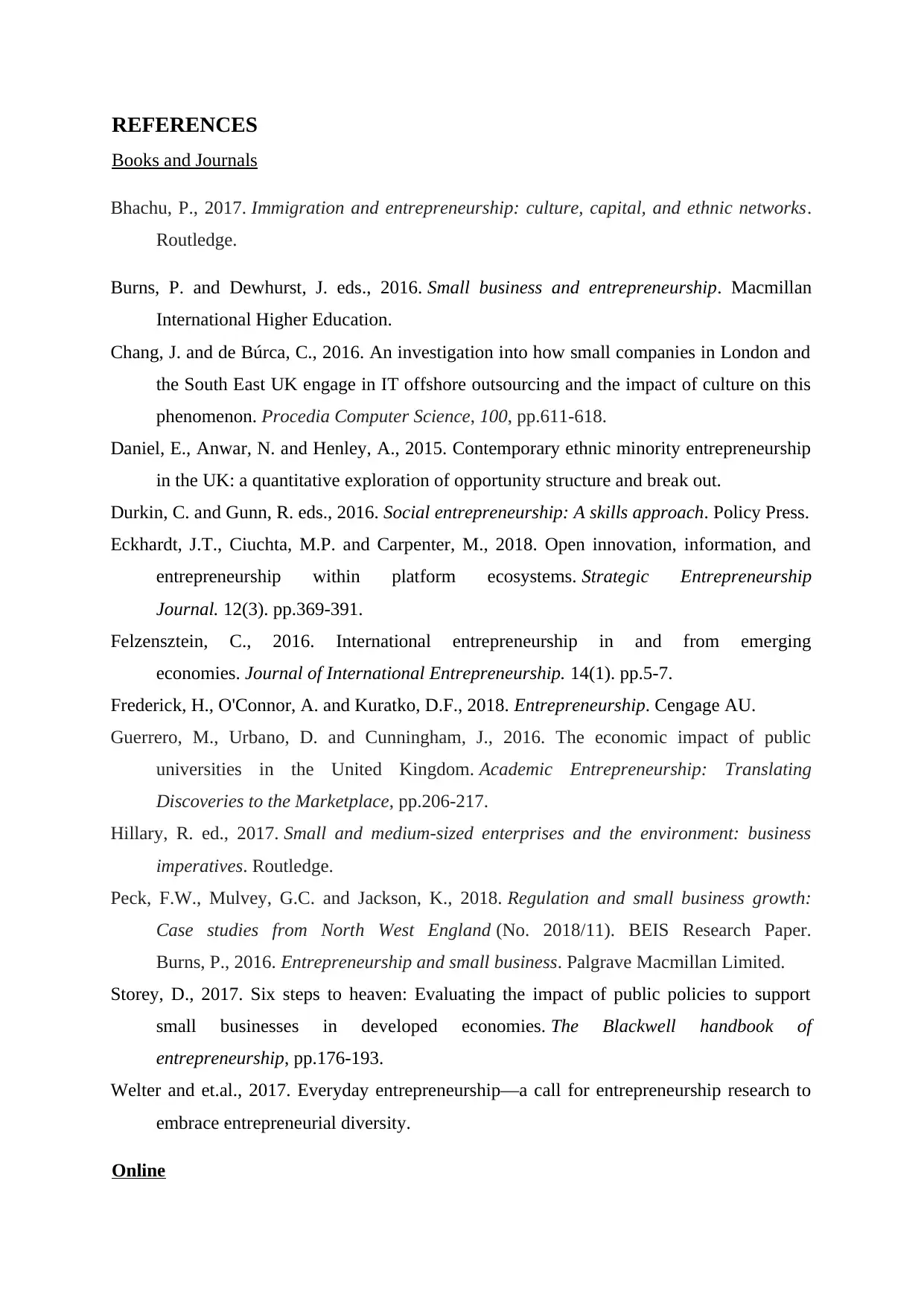
REFERENCES
Books and Journals
Bhachu, P., 2017. Immigration and entrepreneurship: culture, capital, and ethnic networks.
Routledge.
Burns, P. and Dewhurst, J. eds., 2016. Small business and entrepreneurship. Macmillan
International Higher Education.
Chang, J. and de Búrca, C., 2016. An investigation into how small companies in London and
the South East UK engage in IT offshore outsourcing and the impact of culture on this
phenomenon. Procedia Computer Science, 100, pp.611-618.
Daniel, E., Anwar, N. and Henley, A., 2015. Contemporary ethnic minority entrepreneurship
in the UK: a quantitative exploration of opportunity structure and break out.
Durkin, C. and Gunn, R. eds., 2016. Social entrepreneurship: A skills approach. Policy Press.
Eckhardt, J.T., Ciuchta, M.P. and Carpenter, M., 2018. Open innovation, information, and
entrepreneurship within platform ecosystems. Strategic Entrepreneurship
Journal. 12(3). pp.369-391.
Felzensztein, C., 2016. International entrepreneurship in and from emerging
economies. Journal of International Entrepreneurship. 14(1). pp.5-7.
Frederick, H., O'Connor, A. and Kuratko, D.F., 2018. Entrepreneurship. Cengage AU.
Guerrero, M., Urbano, D. and Cunningham, J., 2016. The economic impact of public
universities in the United Kingdom. Academic Entrepreneurship: Translating
Discoveries to the Marketplace, pp.206-217.
Hillary, R. ed., 2017. Small and medium-sized enterprises and the environment: business
imperatives. Routledge.
Peck, F.W., Mulvey, G.C. and Jackson, K., 2018. Regulation and small business growth:
Case studies from North West England (No. 2018/11). BEIS Research Paper.
Burns, P., 2016. Entrepreneurship and small business. Palgrave Macmillan Limited.
Storey, D., 2017. Six steps to heaven: Evaluating the impact of public policies to support
small businesses in developed economies. The Blackwell handbook of
entrepreneurship, pp.176-193.
Welter and et.al., 2017. Everyday entrepreneurship—a call for entrepreneurship research to
embrace entrepreneurial diversity.
Online
Books and Journals
Bhachu, P., 2017. Immigration and entrepreneurship: culture, capital, and ethnic networks.
Routledge.
Burns, P. and Dewhurst, J. eds., 2016. Small business and entrepreneurship. Macmillan
International Higher Education.
Chang, J. and de Búrca, C., 2016. An investigation into how small companies in London and
the South East UK engage in IT offshore outsourcing and the impact of culture on this
phenomenon. Procedia Computer Science, 100, pp.611-618.
Daniel, E., Anwar, N. and Henley, A., 2015. Contemporary ethnic minority entrepreneurship
in the UK: a quantitative exploration of opportunity structure and break out.
Durkin, C. and Gunn, R. eds., 2016. Social entrepreneurship: A skills approach. Policy Press.
Eckhardt, J.T., Ciuchta, M.P. and Carpenter, M., 2018. Open innovation, information, and
entrepreneurship within platform ecosystems. Strategic Entrepreneurship
Journal. 12(3). pp.369-391.
Felzensztein, C., 2016. International entrepreneurship in and from emerging
economies. Journal of International Entrepreneurship. 14(1). pp.5-7.
Frederick, H., O'Connor, A. and Kuratko, D.F., 2018. Entrepreneurship. Cengage AU.
Guerrero, M., Urbano, D. and Cunningham, J., 2016. The economic impact of public
universities in the United Kingdom. Academic Entrepreneurship: Translating
Discoveries to the Marketplace, pp.206-217.
Hillary, R. ed., 2017. Small and medium-sized enterprises and the environment: business
imperatives. Routledge.
Peck, F.W., Mulvey, G.C. and Jackson, K., 2018. Regulation and small business growth:
Case studies from North West England (No. 2018/11). BEIS Research Paper.
Burns, P., 2016. Entrepreneurship and small business. Palgrave Macmillan Limited.
Storey, D., 2017. Six steps to heaven: Evaluating the impact of public policies to support
small businesses in developed economies. The Blackwell handbook of
entrepreneurship, pp.176-193.
Welter and et.al., 2017. Everyday entrepreneurship—a call for entrepreneurship research to
embrace entrepreneurial diversity.
Online
⊘ This is a preview!⊘
Do you want full access?
Subscribe today to unlock all pages.

Trusted by 1+ million students worldwide
1 out of 13
Related Documents
Your All-in-One AI-Powered Toolkit for Academic Success.
+13062052269
info@desklib.com
Available 24*7 on WhatsApp / Email
![[object Object]](/_next/static/media/star-bottom.7253800d.svg)
Unlock your academic potential
Copyright © 2020–2026 A2Z Services. All Rights Reserved. Developed and managed by ZUCOL.





